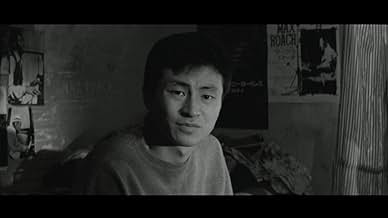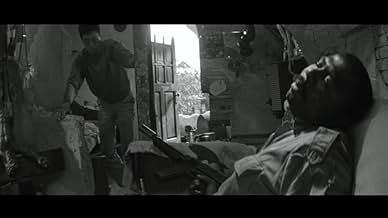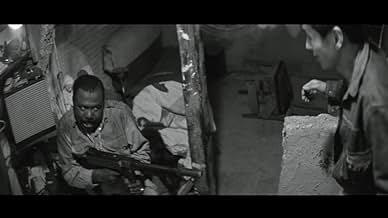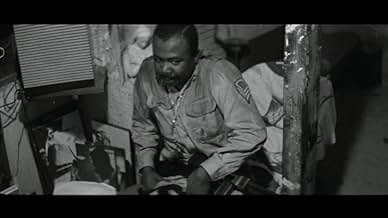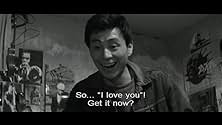Füge eine Handlung in deiner Sprache hinzuOne is a young, jazz-obsessed Japanese drifter and other is a black American GI on the lam in Tokyo. The two outsiders become outlaws and the movie depicts their growing bond as an alternate... Alles lesenOne is a young, jazz-obsessed Japanese drifter and other is a black American GI on the lam in Tokyo. The two outsiders become outlaws and the movie depicts their growing bond as an alternately absurd and tragic culture clash.One is a young, jazz-obsessed Japanese drifter and other is a black American GI on the lam in Tokyo. The two outsiders become outlaws and the movie depicts their growing bond as an alternately absurd and tragic culture clash.
- Regie
- Drehbuch
- Hauptbesetzung
Empfohlene Bewertungen
While watching Black Sun, one can't but think of The Defiant Ones, but one also has to look into the future with John Boormans Hell in The Pacific, which feature Lee Marvin and Toshiro Mifune. It is somewhat about communication, and perhaps how some iconic images sometimes are a barrier to that Communcation.
the main protagonist of the film, Akira, also known as Mei, likes Jazz and Blues, those done by blacks. He is a common criminal, a squatter living in a soon to be demolished Christian church. The Japan we are presented with appears to be that occupied by the occupation of the US. American MP's seem to be all over the place, and appear to have more authority than the Japanese police. It is a Japan still recovering from WWII, with bombed out buildings.
Our main protagonist is a little bit on the crazy side, and would appear that if he were living as a youth in todays culture, he would be right at home. While he lives music by blacks, it will become very apparent that he knows nothing about them, and only thinks he does by the music he hears. He will shortly be getting a rude awakening, and he is confronted by a wounded black soldier named Gil, played by Chico Rolands, who may have killed another white American soldier, though this is never made clear.
During his time with Gil, he will find that he also can hate blacks when Gil does a wrong to him. though he has said to the wounded and desperate Gil, that blacks are his friends.
The film shows stills of what black people suffer in the US at the time, but while this may be an indictment of the US, and perhaps trying to compare some kind of oppression for the Japanese underclass, and well as the American Negro in America, the director in a very key scene in a seedy nightclub, filled with the iconic images of American Jazz musicians, that these so called Japanese fans, are really not much better than the American white racists.
Gil at one point mumbles out, that the pictures of the Jazz musicians are also the enemy. This person is in a very delirious state, but this filmed story will suggest, that when the record collection of our protagonist is destroyed, that it is only then that some form of communication and bond can be really formed, even with the language difficulties. the ending, also is quite powerful, and will explain something about the film.
if their is a problem with the film. It is that sometimes it feels as if the director is making some kind of enthnograph film. often with the Chico Rolland character we can barely make what he is saying. Is this intentional, were his English lines dubbed or subtitled in Japanese at the time of this release. Also he does not appear to be a full fledged human being, as he is sometimes because of the desperate nature of his predicament, just a symbol of 'what blacks suffer in this world'. Also sometimes the performance that he is forced to give, is occasionally embarrassing.
this film has recently been released by Criterion on their Eclipse series, along with four other films, 'The Warped Ones' included. It is ashame their are no extras, as it would be interesting to learn about some of the actors, and the reception it received in Japan. Who was Chico Roland's? was he an American? He and the main protagonist did make other films with this director. I plan to see those other films, and I recommend that readers try to get a hold of this one.
the main protagonist of the film, Akira, also known as Mei, likes Jazz and Blues, those done by blacks. He is a common criminal, a squatter living in a soon to be demolished Christian church. The Japan we are presented with appears to be that occupied by the occupation of the US. American MP's seem to be all over the place, and appear to have more authority than the Japanese police. It is a Japan still recovering from WWII, with bombed out buildings.
Our main protagonist is a little bit on the crazy side, and would appear that if he were living as a youth in todays culture, he would be right at home. While he lives music by blacks, it will become very apparent that he knows nothing about them, and only thinks he does by the music he hears. He will shortly be getting a rude awakening, and he is confronted by a wounded black soldier named Gil, played by Chico Rolands, who may have killed another white American soldier, though this is never made clear.
During his time with Gil, he will find that he also can hate blacks when Gil does a wrong to him. though he has said to the wounded and desperate Gil, that blacks are his friends.
The film shows stills of what black people suffer in the US at the time, but while this may be an indictment of the US, and perhaps trying to compare some kind of oppression for the Japanese underclass, and well as the American Negro in America, the director in a very key scene in a seedy nightclub, filled with the iconic images of American Jazz musicians, that these so called Japanese fans, are really not much better than the American white racists.
Gil at one point mumbles out, that the pictures of the Jazz musicians are also the enemy. This person is in a very delirious state, but this filmed story will suggest, that when the record collection of our protagonist is destroyed, that it is only then that some form of communication and bond can be really formed, even with the language difficulties. the ending, also is quite powerful, and will explain something about the film.
if their is a problem with the film. It is that sometimes it feels as if the director is making some kind of enthnograph film. often with the Chico Rolland character we can barely make what he is saying. Is this intentional, were his English lines dubbed or subtitled in Japanese at the time of this release. Also he does not appear to be a full fledged human being, as he is sometimes because of the desperate nature of his predicament, just a symbol of 'what blacks suffer in this world'. Also sometimes the performance that he is forced to give, is occasionally embarrassing.
this film has recently been released by Criterion on their Eclipse series, along with four other films, 'The Warped Ones' included. It is ashame their are no extras, as it would be interesting to learn about some of the actors, and the reception it received in Japan. Who was Chico Roland's? was he an American? He and the main protagonist did make other films with this director. I plan to see those other films, and I recommend that readers try to get a hold of this one.
Lots of shouting, bad dialogue, illogical actions (eg wading in sewage with open wound, etc...) ... that ending was out of an old Twilight Zone episode.
Wusstest du schon
- WissenswertesMusic performed by Max Roach Quartet with Abbey Lincoln.
- VerbindungenReferenced in Best in Action: 1964 (2020)
Top-Auswahl
Melde dich zum Bewerten an und greife auf die Watchlist für personalisierte Empfehlungen zu.
Details
- Laufzeit
- 1 Std. 35 Min.(95 min)
- Farbe
- Seitenverhältnis
- 2.35 : 1
Zu dieser Seite beitragen
Bearbeitung vorschlagen oder fehlenden Inhalt hinzufügen

